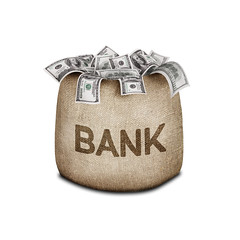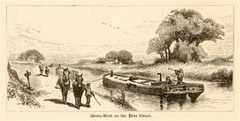AP US History Period 4 (1800-1848) Flashcards
Key events and terms for mastery of the time period 1800-1848
Terms : Hide Images [1]
| 8370370498 | Era of Good Feelings | A name for President Monroe's two terms, a period of strong nationalism, economic growth, and territorial expansion. Since the Federalist party dissolved after the War of 1812, there was only one political party and no partisan conflicts. |  | 0 |
| 8370370499 | Sectionalism | Different parts of the country developing unique and separate cultures (as the North, South and West). | 1 | |
| 8370370500 | Tariff of "Abominations" | designed to protect industry in the northern United States. |  | 2 |
| 8370370501 | American System | An economic regime pioneered by Henry Clay which created a high tariff to support internal improvements such as road-building. This approach was intended to allow the United States to grow and prosper by themselves This would eventually help America industrialize and become an economic power. | 3 | |
| 8370370502 | The Bank War | Andrew Jackson vetoed the recharter bill of the Second Bank of the United States on July 10, 1832, which was a blow against monopolies, "New England aristocrats", and foreign domination, but a victory for labor. Jackson created pet banks and destabilized the national currency. |  | 4 |
| 8370370503 | Panic of 1819 | 1st economic depression (under US Constitution); marked the end of economic expansion and featured deflation (value of US money going down), depression, bank failures, foreclosures on western farms, unemployment, a slump in agriculture and manufacturing, and overcrowded debtor's prisons. Caused by the National Bank's tightening of its credit lending policies, aimed at stopping risky lending practices and over speculation on lands in west, forcing state and local banks to foreclose mortgages on farms resulting in bankruptcies. |  | 5 |
| 8370370504 | Marbury v Madison | (1803) Marbury was a midnight appointee of the Adams administration and sued Madison for commission. Chief Justice Marshall said the law that gave the courts the power to rule over this issue was unconstitutional. established judicial review |  | 6 |
| 8370370505 | McCulloch v Maryland | Maryland was trying to tax the national bank and Supreme Court ruled that federal law was stronger than the state law |  | 7 |
| 8370370506 | Worcester v Georgia | A case in which the United States Supreme Court vacated the conviction of Samuel Worcester and held that the Georgia criminal statute that prohibited non-Indians from being present on Indian lands without a license from the state was unconstitutional; led to the removal of Cherokee from their native lands. |  | 8 |
| 8370370507 | Missouri Compromise of 1820 | Allowed Missouri to enter the union as a slave state, Maine to enter the union as a free state, prohibited slavery north of latitude 36˚ 30' within the Louisiana Territory | 9 | |
| 8370370508 | Rush-Bagot Treaty | between the U.S. and Great Britain (which controlled Canada) provided for the mutual disarmament of the Great Lakes. This was later expanded into an unarmed Canada/U.S. border. |  | 10 |
| 8370370509 | Adams Onis Treaty | U.S. gained Florida in exchange for $5 million and renounced any claims on Texas and settled boundary between two countries to the Pacific Ocean. |  | 11 |
| 8370370510 | Monroe Doctrine | Declared that Europe should not interfere in the affairs of the Western Hemisphere and that any attempt at interference by a European power would be seen as a threat to the U.S. |  | 12 |
| 8370370511 | National Road | First national road building project funded by Congress. It made travel and transportation of goods much easier because it was one continuous road that was in good condition. |  | 13 |
| 8370370512 | Erie Canal | A canal between the New York cities of Albany and Buffalo, completed in 1825. The canal, considered a marvel of the modern world at the time, allowed western farmers to ship surplus crops to sell in the North and allowed northern manufacturers to ship finished goods to sell in the West. Connected Great Lakes farms and western markets with New York City leading to its rise as a center of trade and commerce. |  | 14 |
| 8370370513 | Eli Whitney | An American inventor who developed the cotton gin. Also contributed to the concept of interchangeable parts that were exactly alike and easily assembled or exchanged |  | 15 |
| 8370370514 | Lowell System | Developed in textile mills in Lowell, Massachusetts, during the 1820s, where few skilled workers were needed, labor was done mostly by single young farm women, who worked for a few years and then returned home to be housewives. |  | 16 |
| 8370370515 | Market Revolution | Dramatic increase between 1820 and 1850 in the exchange of goods and services in market transactions. Resulted from the increased output of farms and factories, the entrepreneurial activities of traders and merchants, and the development of a transportation network of roads, canals and railroads. |  | 17 |
| 8370370516 | Embargo Act of 1807 | Meant to force Britain and France to change their policies towards neutral vessels by depriving them of American trade; difficult to enforce because it was opposed by merchants and it hurt the national economy; replaced by the Non-Intercourse Act. |  | 18 |
| 8370370517 | War of 1812 | between the United States and England caused by impressment of American sailors, British aid to Indians in the west with firearms, War Hawks desire to invade Canada, and continued British interference with trade. |  | 19 |
| 8370370518 | Battle of New Orleans | A battle during the War of 1812 where the British army attempted to take New Orleans. Due to the foolish frontal attack, Jackson defeated them, which gave him an enormous popularity boost. |  | 20 |
| 8370370519 | Treaty of Ghent | December 24, 1814 - Ended the War of 1812 and restored the status quo. For the most part, territory captured in the war was returned to the original owner. It also set up a commission to determine the disputed Canada/U.S. border. The important result of the War of 1812 was that the US maintained its independence from Great Britain. |  | 21 |
| 8370370520 | Lewis and Clark | Sent on an expedition by Jefferson to gather information on the United States' new land and map a route to the Pacific. They kept very careful maps and records of this new land acquired from the Louisiana Purchase. |  | 22 |
| 8370370521 | Louisiana Purchase | Made by Jefferson, this doubled the size of the US. |  | 23 |
| 8370370522 | Revolution of 1800 | represented a return to what Jefferson considered the original spirit of the Revolution, restoring the republican experiment, checking the growth of government power, and halting the decay of virtue that had set in under Federalist rule. |  | 24 |
| 8370370523 | Barbary Pirate Wars | At issue was the demand of tribute from American merchant vessels in the Mediterranean Sea. American naval power attacked North African cities and extracted concessions of fair passage from their rulers. |  | 25 |
| 8370370524 | Tecumseh | A Shawnee chief who, along with his brother, Tenskwatawa (known as The Prophet) worked to unite the Northwestern Indian tribes, which was defeated by an American army led by William Henry Harrison at the Battle of Tippecanoe in 1811. |  | 26 |
| 8370370525 | Hartford Convention | a meeting of Federalists at Hartford, Connecticut, to protest the War of 1812; New England states threatened to leave the union if the war continued |  | 27 |
| 8370370526 | "Corrupt Bargain" | what Jackson and followers called the Clay/Adams deal that kept him from election in 1824. |  | 28 |
| 8370370527 | Jacksonian Democracy | an expansion of voting rights to ensure majority rule during 1820's/30s |  | 29 |
| 8370370528 | Nullification Crisis | Conflict that resulted when South Carolina voided federal tariffs and threatened to secede |  | 30 |
| 8370370529 | Trail of Tears | The removal of Cherokee Indians from Georgia to Indian Territory in 1838 and 1839 |  | 31 |
| 8370370530 | Whig party | Political party formed by Henry clay, Daniel Webster, and other Jackson opponents |  | 32 |
| 8370370531 | Webster-Hayne Debate | series of speeches in the Senate, during which South Carolina interpreted the Constitution as little more than a treaty between sovereign states, while Massachusetts expressed the concept of the United States as one nation. |  | 33 |
| 8370370532 | Samuel Slater | Father of the Factory system-memorized the ideas of Britain's factory system |  | 34 |
| 8370370533 | Steam Power | an efficient power source for machines in factories and trains |  | 35 |
| 8370370534 | Second Great Awakening | religious revival that swept the country and helped inspire reform movements, especially the abolitionist movement |  | 36 |
| 8370370535 | Cult of Domesticity | a belief that married women should restrict their activities to their home and family |  | 37 |
| 8370370536 | Hudson River School | American artistic movement that produced romantic renditions of local landscapes. |  | 38 |
| 8370370537 | Dorothea Dix | Reformer who was a pioneer in the movement for better treatment of prisoners and the mentally ill |  | 39 |
| 8370370538 | Seneca Falls Convention | the first organized public meeting about women's rights held in the United States |  | 40 |
| 8370370539 | Utopian Societies | Small societies dedicated to perfection in social and political conditions |  | 41 |
| 8370370540 | Transcendentalism | the belief that people could transcend, or rise above, material things in life. |  | 42 |
| 8370370541 | Nat Turner's Rebellion | the largest and deadliest slave uprising in U.S. history; resulted in new laws (South) prohibiting education of slaves and free black people, restricting rights of assembly and other civil rights for free black people, and requiring white ministers to be present at all worship services. | 43 | |
| 8370370542 | 54-40 or fight | Popular slogan that led Polk's to victory, reflecting popular sentiment towards expansion that included Texas, California, and the entire Oregon territory. |  | 44 |
| 8370370543 | Mexican-American War | Instigated by the US with the intent of gaining California, but led to the conquest of over 500,000 square miles of land in the Southwest |  | 45 |
| 8370370544 | Wilmot Proviso | 1846 proposal that outlawed slavery in any territory gained from the War with Mexico |  | 46 |
| 8370370545 | Treaty of Guadalupe Hidalgo | A treaty that ended the Mexican War and gave the U.S. much of Mexico's northern territory | 47 | |
| 8370370546 | Free Soil Party | Political party formed to oppose extending slavery in the territories | 48 | |
| 8370370547 | Know-Nothing Party | Political party of the 1850s that was anti-Catholic and anti-immigrant | 49 | |
| 8370370548 | Manifest Destiny | the belief by Americans that they were destined to spread out across the continent |  | 50 |
| 8370370549 | Mormons | members of the Church of Jesus Christ of Latter-Day Saints founded by Joseph Smith in 1830; Relocated to Utah to escape religious persecution, settling in Salt Lake City, Utah | 51 |
